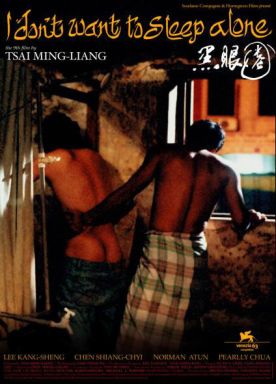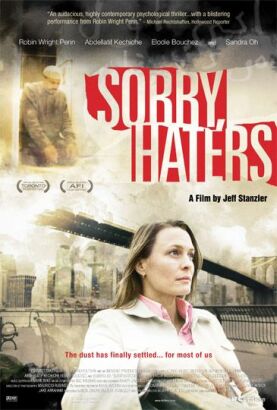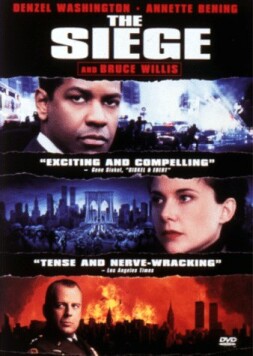I Don’t Want to Sleep Alone (Hei Yan Quan)
Back in the go-go Sixties, it used to be thought that a moving camera gave movies the hallmark of reality. The bobbing, hand-held camera was what put the vérité into cinéma vérité, and it went mainstream with the invention of the Steadicam in the 1970s. The works of Martin Scorsese are unimaginable without it. But now that we see the moving camera as a familiar feature even of such TV shows as “The Office” or “Lost,” we’ve grown so used to this “real” look that it doesn’t look, well, quite real anymore. Now directors who strive to give their films the look of authenticity are more likely to plant a stationary camera with a wide-angle but deep focus shot and have their actors wandering in and out of the unmoving frame in enormously long takes — sometimes while ambient, mostly off-camera noise takes the place of dialogue. It’s the reality of the surveillance camera.
It’s also tremendously boring, unless you’ve schooled yourself into an appreciation of the style. If you have taken the trouble to do that, Tsai Ming-Liang’s I Don’t Want to Sleep Alone (Hei Yan Quan) may be the movie for you. Using the above-mentioned techniques throughout, and with almost no dialogue, Mr Tsai — whose previous films include What Time is it There? (2001) and The Wayward Cloud (2005) — manages to tell quite a complex story of love and loneliness set in Kuala Lumpur against the background of economic upheaval and stagnation which followed the Asian economic crisis of the late 1990s. Complex, but not very interesting.
Set mostly in the unfinished and abandoned concrete shell of a high-rise building whose subterranean storeys are filled with rainwater, the film takes us into the demi-monde of foreign guest-workers who came to Malaysia — mostly from Bangladesh and Indonesia — in the boom times and stayed on illegally after the crash, living a hand-to-mouth existence on the streets or in improvised squats. Hsiao Kang (Lee Kang-Sheng), an ethnic Chinese who apparently speaks no Malay, joins a crowd surrounding a street huckster who is promising to sell people winning lottery numbers. When he is found to have no money and to be unable to speak their language, several of those in the crowd beat him and leave him for dead.
He is found by a group of Bangladeshis who have scrounged an old mattress somewhere and are taking it back to the squat of one of them, Rwang (Norman Atun). They put Hsiao Kang on the mattress and take him along with it back to Rwang’s place. Rwang nurses him back to health. The two young men sleep side by side on the mattress. There are some hints that a sexual relationship develops between them, but this is never made explicit. We are left to infer it, mostly from Rwang’s jealous reaction when Hsiao Kang, after recovering from his injuries, engages in a sexual relationship with a girl, Chyi (Chen Shiang-chyi), who has wandered in to their story from the second of the film’s two narrative strands.
In this, Mr Lee plays another role, that of a young victim of paralysis — or perhaps catatonia — lying in a hospital bed in the main living area of his family’s apartment above a tea-shop or café run by his mother (Pearlly Chua). In several long takes, we watch as his mother attends to his physical needs — or as he just lies there, immobile, while arias from Mozart’s Magic Flute play on a boom-box beside him. The Mozart is partly an acknowledgment of the fact that the movie was commissioned by the Mozart New Crowned Hope Festival of Vienna last year, but there are also in the film what might be regarded as echoes of the opera’s plot — in which a prince must undertake a quest to release (and marry) a captive princess.
In this case, the captive princess is Chyi, who is a waitress in the café. She sleeps in a tiny attic room immediately above the paralyzed youth, whose bed she can see through the floorboards. His mother, her employer — presumably occupying the Queen of the Night role (there doesn’t seem to be any Sarastro) — badly mistreats Chyi, but she is in turn badly used by another son (Samantha Toh Su-Yee) as he tries to sell the café out from under her. At one point we see the Lady Boss anointing herself with some kind of lotion and then turning to Chyi, in what at first seems a stray gesture of kindness and humanity, and putting some of the lotion on her hand. But then she drags the girl to the bed where her comatose son lies and forces the now-lubricated hand down the front of his diaper.
Like the vast, largely empty narrative spaces of the film or the imposing ghost of economic prosperity in the form of the abandoned high-rise, these are images of an almost desperate loneliness. Eventually Chyi, Rwang and the Lady Boss all become rivals for the romantic attentions of Hsiao Kang — whose own passivity towards the three of them rivals that of his alter ego, the paralyzed boy dreaming of Mozartian romance. It’s a basically comic scenario, and a romantic scene between Hsiao Kang and Chyi, coughing and wheezing through their improvised face masks when a cloud of pollution descends on the city, plays to this side of the film. So perhaps, in its final scene, does the Mozartian sense of all-enveloping forgiveness borrowed from The Marriage of Figaro rather than The Magic Flute. But to get to it you have to come equipped with enormous patience for the movie’s own form of paralysis and stagnation in the form of its immobility and glacial pace.
Discover more from James Bowman
Subscribe to get the latest posts to your email.






